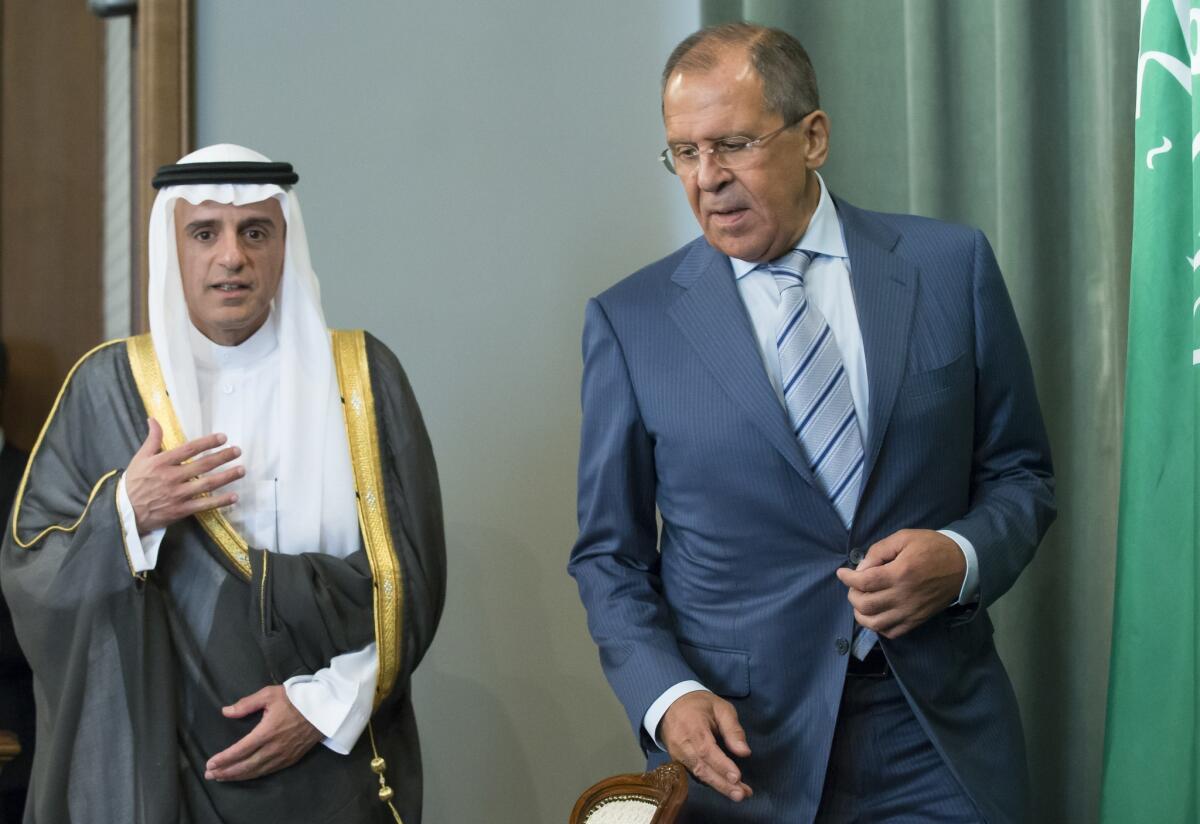Russia on diplomatic offensive to defeat Islamic State, end Syrian war

Russian Foreign Minister Sergei Lavrov, right, and Saudi counterpart Adel Jubeir arrive at a news conference after their meeting in Moscow on Aug. 11, 2015.
- Share via
Russia pressed its diplomatic offensive Tuesday in the Syrian crisis by hosting the Saudi foreign minister for talks that derailed over whether Syrian President Bashar Assad should have a role in the embattled country’s postwar future.
Russian Foreign Minister Sergei Lavrov and his Saudi counterpart, Adel Jubeir, also disagreed about including Assad in the campaign to eradicate Islamic State extremists who have thrived amid the chaos of Syria’s civil war.
Moscow is one of Assad’s few remaining allies. The Kremlin also has good relations with Iran, another backer of the Syrian government that is the target of the rebellion now in its fifth year.
But the agreement between Iran and six foreign powers that is expected to put the brakes on any effort by Tehran to develop nuclear weapons has opened up what analysts see as an opportunity to redefine political relationships in the Middle East.
Russian President Vladimir Putin launched a Kremlin diplomatic flurry in June when he met with Prince Mohammed bin Salman, Saudi Arabia’s defense minister and second in line to the kingdom’s throne. Putin then laid out a plan that will bring Syrian opposition leaders to Moscow for the first time next week, as well as a slate of other meetings with Iranian and United Nations officials for strategy sessions on how to end the Syrian conflict.
NEWSLETTER: Get the day’s top headlines from Times Editor Davan Maharaj >>
Lavrov met with Jubeir in Qatar last week for talks that also included U.S. Secretary of State John F. Kerry, and the Russian and U.S. top diplomats met again to discuss Syria and Islamic State two days later in Kuala Lumpur, Malaysia, site of the annual Assn. of Southeast Asian Nations summit this year.
Saudi Arabia is allied with the United States in the multinational air campaign directed at Islamic State militants who have seized vast areas of Syria and Iraq in the midst of sectarian fighting that afflicts both countries. And Riyadh and Washington share the view that Assad has no positive role to play in either a peaceful Syrian future or the fight against Islamic State.
Lavrov on Tuesday sought to persuade Jubeir that all forces opposed to Islamic State needed to coordinate and collaborate to defeat the militants who have killed thousands, many in gruesome executions that were videotaped and posted on the Internet.
But the Saudi diplomat rejected a united force involving Assad’s troops, whose brutal treatment of Syrian rebel supporters and Sunni Muslims has helped mobilize Islamic State and enhance its influence with Sunnis in the region.
“As for a coalition in which Saudi Arabia would participate with the government of Syria, then we need to exclude that. It is not part of our plans,” Jubeir told Lavrov. “We think that Bashar al-Assad is part of the problem, not part of the solution.”
Turkey, which only recently joined the coalition airstrikes against Islamic State and a joint mission with U.S. forces to create a safe haven for Syrian refugees along the Turkish-Syrian border, also rejects any notion of cooperating with Assad.
Turkish President Recep Tayyip Erdogan met with Putin in June and told journalists last week that he sensed a change in the Kremlin leader’s previously unfettered backing of Assad.
“He is no longer of the opinion that Russia will support Assad to the end. I believe he can give up Assad,” the Turkish president said.
None of the recent Russian diplomatic discussions on the Syrian conflict have reflected such a sea change in Kremlin policy. However, Lavrov has said the talks with Kerry and Jubeir have found common ground on the need to eradicate Islamic State and bring peace to Syria, where the United Nations estimates that 250,000 people have been killed and 4 million forced to flee the country.
“We agreed to continue thinking about steps that should be taken to create a suitable environment to resume dialogue between the Syrian government and all other Syrian groups,” Lavrov said of his discussion with Jubeir.
Follow @cjwilliamslat for the latest international news 24/7
ALSO:
Greece agrees ‘in principle’ to new bailout; talks continue
Afghan leader to Pakistan: Rein in terrorists who attack my country
Investigators examine missile parts in probe of MH17 crash in Ukraine
More to Read
Sign up for Essential California
The most important California stories and recommendations in your inbox every morning.
You may occasionally receive promotional content from the Los Angeles Times.














